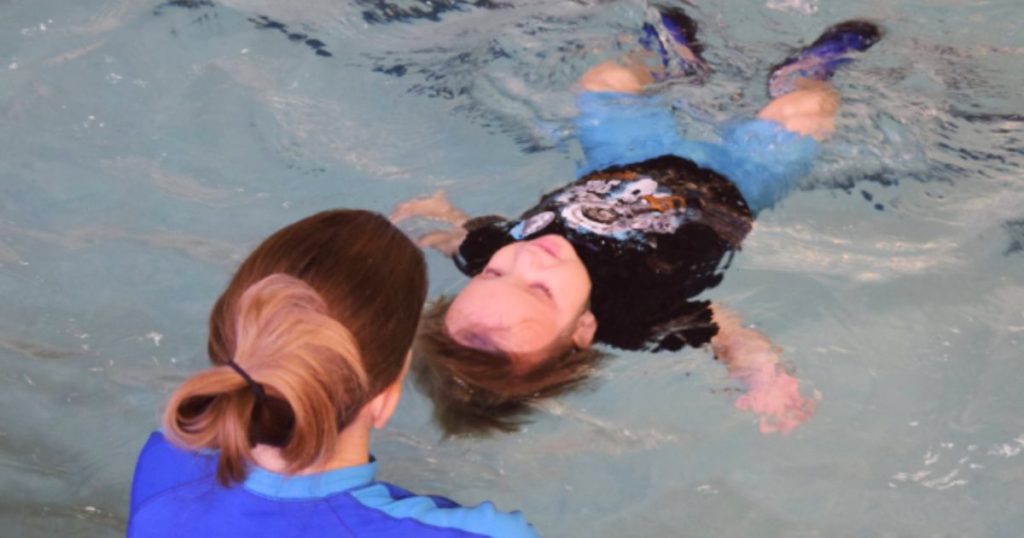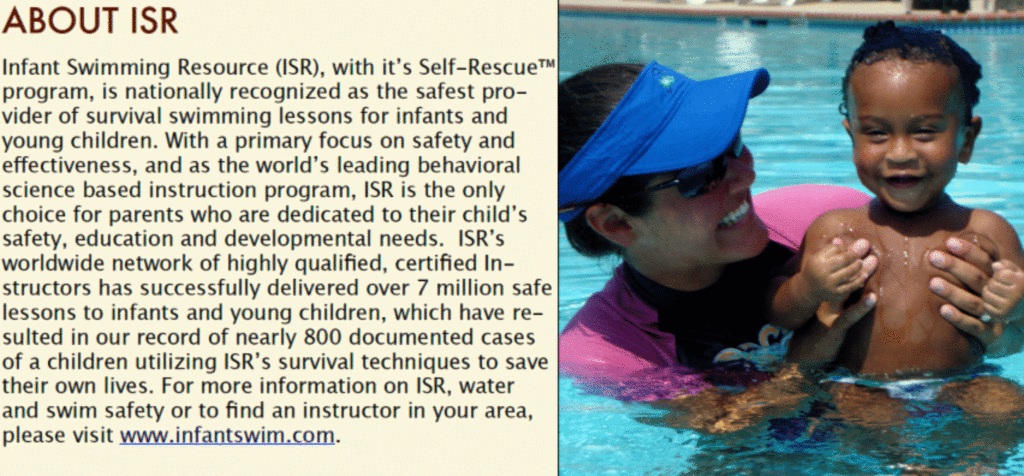FREQUENTLY ASKED QUESTIONS
Safety
Are swimming lessons for infants and
young children safe?
YES! ISR’s Self-Rescue™ program is dedicated to
safety and maintaining numerous safety protocols
to promote safe lessons. Your child’s health
and well-being are our highest priority and are
closely monitored on a daily basis. In addition,
your child’s medical and developmental history is
a mandatory part of the ISR national registration
process, all of which is held strictly confidential.
All ISR instructors undergo an intensive and 8-
week in-water and academic training that far exceeds
any other training program of this kind.
Each ISR instructor is also required to attend a
yearly re-certification that includes quality control
as well as continuing education. Your education
in the area of aquatic safety for your entire
family is an integral part of your child’s lessons.
You will receive access to the “Parent Resource
Guide,” written by Dr. Harvey Barnett and JoAnn
Barnett, which will inform you of every aspect of
swimming for infants and children. With research,
you will find that ISR is the safest survival
swimming program but also the most effective
for teaching infants and young children.
Why ISR?
Why should parents enroll their children
in ISR lessons?
ISR parents are intelligent and enroll their children
because they understand their children’s
abilities and want to give them every opportunity
to learn. They also feel it is important to teach
their children how to help themselves should
they find themselves alone in the water. Research
shows that there are better times to learn certain
things and swimming is best learned early in life.
(Newsweek and Drowning Statistics)
What is ISR and how is it different from other swimming programs?
ISR is the product over 45 years of ongoing development in the area of aquatic survival instruction for infants
and children. ISR’s primary focus is to teach you child to become a productive
swimmer, or floater in any depth of water. The goal of ISR is that your child becomes an “aquatic problem solver.” ISR will greatly increase your child’s chance of surviving an aquatic accident, even when fully clothed!
What other benefits do the ISR lesson experience
provide students?
Every child is unique. However, many parents report
that once their young children have mastered
learning to swim, the resulting confidence
in their abilities engenders a positive selfconcept
that is often demonstrated in other aspects
of their personalities. There are also obvious
health and other psychological gains.
I hear you say your priority is survival
skills. Will my child learn to actually
swim?
Yes. At ISR, we believe that part of survival for a
child who can walk is swimming. Children learn
the swim-float-swim sequence so that they
could get themselves to safety. The difference in
our program is that they will learn swimming
AND survival skills and how to be an aquatic
problem solver.

Jennifer Sherman | j.sherman@infantswim.com | Phone: 321.710.5425 | Pool Hours: Mon.- Fri. 9am -11am
About Lessons
Why are lessons 5 days per week and for
only 10 minutes?
The reason for this is multifaceted. First, repetition
and consistency are crucial elements of
learning for young children. Research shows that
short, more frequent lessons result in higher retention.
Second, most children have fairly short
attention spans and will not be able to focus on
the task for longer and we want to take advantage
of the best time for learning. A third reason
is that, though the pool temperature is maintained
at 78-88 degrees, the temperature is still
lower than your child’s body temperature. Lessons
are work and therefore your child will also
be loosing body heat. Instructors check students
regularly for temperature fatigue since this is an
indicator of physical fatigue.
If more frequent but shorter lessons are
better, then why don’t you teach 7 days/
week?
Everyone needs a little break from learning to
process the information and in this case to give
muscles a chance to recover. In addition, you
need to be able to spend time with your family,
as does your instructor. Weekends are family
time. Periodically, if weather or other issues
have cause lessons to be cancelled for numerous
days, your instructor may choose to offer make
up lessons on a weekend. This is strictly up to
the instructor and based on the availability of
parents.
Why does it take 4-6 weeks for my child
to learn this?
The 4-6 weeks is an estimate that is based on
the average time in which it takes most children
to learn these survival skills. Every child is
unique and ISR’s Self-Rescue program is specifically
designed based on your child’s individual
strengths and needs. It is important to realize
that this is an average which means that some
children will actually finish more quickly while
others will need more practice. ISR is dedicated
to safety and, therefore, we want to provide your
child with the time and best opportunity to become
proficient in his/her survival skills. We will
always honor your child’s needs.
Why do you have the children swim in
clothes?
Because 86% of children, who fall in the water, do
so fully clothed, we want our students to have
experience with such a situation. If a child has
experienced the sensations of being in the water
in clothing prior to an emergency situation, he/
she is less likely to experience panic and be able
to focus on the task at hand. If you have ever
jumped in the water with clothes on, then you
know that there is a significant difference in
weight and feel with clothes as opposed to a
bathing suit.
What is the retention rate with ISR lessons?
ISR claims a retention rate of 94-100% up to one
year following lessons. Having said this, children
will explore and may pick up bad habits watching
other children or with interference like floating in
a bathtub or playing on the steps. As your child
goes through lessons, you will begin to understand,
through communication with your Instructor,
what activities may interfere with his/her
learned Self-Rescue skills. Contacting and/or
returning to your instructor in a timely manner is
imperative to maintaining effective habits.
Jennifer Sherman | j.sherman@infantswim.com | Phone: 321.710.5425 | Pool Hours: Mon.- Fri. 9am -11am
Do you have children that just can’t learn
the skills?
No. Every child can learn. It is the Instructor’s
job to find the best way to communicate the information
so that it makes sense to the child.
We set your child up to be successful every time.
We start where they are.
How can you teach babies and young children
to swim?
ISR instructors teach infants to swim by honoring
each child’s individual strengths and experiences.
They understand the fundamentals of the
behavioral sciences, child development and of
sensori-motor learning as it relates to the acquisition
of aquatic survival skills; they use this
education to guide each child through the sequence
of learning to swim and float.
Can you really teach a child who is not
verbal how to swim?
Yes. Consider that children learn to sit, crawl
and walk before they learn to speak. Because
we teach through sensori-motor learning, verbal
skills are not required for a child to acquire Self-
Rescue skills. We are able to communicate with
our students through touch and positive reinforcement
while striving to set our students up
for success every step of the way.
How do you teach them to hold their
breath?
Breath holding skills are taught in the first lesson.
We shape breath control using highly effective
positive reinforcement techniques. We continue
to reinforce these breath-holding techniques
throughout every lesson.
How is it that babies can learn to respond
to the danger of water when they fall in?
A baby does not need to perceive danger or be
afraid to respond appropriately to being underwater.
If a baby has learned to roll over and float
when he needs air, he doesn’t need to perceive
danger in order to respond in this manner. He
needs skill, practice and confidence to calmly
deal with the situation.
Is it the baby fat that makes them float?
Actually, the primary factor in a baby’s ability to
float is the ability to take air into the lungs. To
maintain this access to air, the child must adjust
his/her posture. The difference in positioning
for an adult can be inches. For a baby, this adjustment
is reduced to centimeters. If a child’s
body posture is just a few centimeters off, it can
make the difference between the face being
submerged or the child having access to air.
Can’t babies swim naturally?
Unfortunately, babies cannot naturally swim. If
this were the case, there wouldn’t be so many
drownings every year. According to the Centers
for Disease Control and Prevention (CDC),
drowning is the leading cause of accidental death
for children ages 1-4 in the United States.
Why don’t parents participate in the water
during the lessons?
We do not want the baby to initially associate the
water with the love, attention and affection of the
parent while in the water. Also, it takes incredible
concentration and objectivity to teach the baby
how to respond to an aquatic emergency and our
research shows that parents often find it too difficult
to be objective to be effective teachers with
their own children in the water.
Jennifer Sherman | j.sherman@infantswim.com | Phone: 321.710.5425 | Pool Hours: Mon.- Fri. 9am -11am
How do the kids react during the first few
lessons?
Children often fuss during the first few lessons
because they are in a new environment, learning
something new and around new people. As your
child becomes more confident in his/her ability
in the water, the fussing will decrease.
It is not unlike the first time you tried a new exercise
class, or were asked to perform a task at
work that you’d never done before: the first time
you try a new task it is always challenging, until
you get the hang of it. It is the same for your
young child. Your child is learning to perform a
skill that he/she’s never done before.
Will my child fear the water because of
lessons?
There is an important difference between being
fearful and being apprehensive because you are
not yet skilled in a new environment. ISR is not
like traditional swim lessons; it is a drowning
prevention program that teaches survival swimming.
Sometimes as a parent, you make choices
for your child’s safety, like sitting in a car seat,
because you know they are important. The same
can be said for ISR.
FUN can be defined as when SKILL meets CHALLENGE.
Once competent in their skills, many
children cannot be dragged away from the pool.
They are having entirely too much FUN.
Refresher Lessons
Will my child need additional lessons?
Based on our research, we know that refresher
lessons are important because children change
so much both cognitively and physically during
the first 4-5 years of life. It is important that
their water survival skills grow with their bodies.
Frequency depends on the child’s age, growth
rate, skill level and confidence level. The goal of
refresher lessons is to help your child adjust his/
her new body size and weight to his/her existing
skill level. Your instructor will work with your
child to help fine-tune his or her aquatic experience
to assist with building efficiency, which will
result in self-confidence. This is especially important
if your child has not been able to practice
any appropriate aquatic skill between seasons.
American Academy of Pediatrics
(AAP)
What do doctor’s have to say about
swimming lessons?
In May of 2010, the AAP has now changed it’s
policy regarding the age at which children may
start swimming lessons, based on research stating
that swim lessons may actually provide reduction
in drowning risk of children ages 1- to
4-years-old. That study, Association Between
Swimming Lessons and Childhood Drowning
published in the Archives of Pediatric and Adolescent
Medicine, March, 2009, by Brenner et. al.
was the first study to probe the relationship between
drowning reduction and swimming skills.
That study concluded that, “Participation in formal
swimming lessons was associated with an
88% reduction in the risk of drowning in the 1-
to 4-year-old children…”
The AAP encourages parent’s to consider that
starting water-survival skills training at an early
age must be individualized, based on the child’s
frequency of exposure to water, emotional maturity,
physical limitations and health concerns related to swimming pools.
Jennifer Sherman | j.sherman@infantswim.com | Phone: 321.710.5425 | Pool Hours: Mon.- Fri. 9am -11am
Chlorine
How safe is it for young children to swim
in a chlorinated pool?
The pH balance and overall chemistry of all pools
are affected by many variables, such as air temperature,
water temperature, sunlight, humidity
controls, fans, the type and amount of water
treatment, as well as, the delivery system for the
chemicals, etc.
Studies have shown that a properly maintained
pool causes no respiratory threat to young children.
Specifically, when the exposure to the pool
is limited, as in the case of ISR lessons, which are
limited to 10 minutes per day. The ISR Registration
Evaluation Team (RET) screens for children
with existing and family histories of asthma and
other respiratory issues and alerts the Instructor
for special procedures to accommodate the
situations as they are presented each day at lessons.
For more than 30 years, ISR’s use of BUDS
(Bowel, Urine, Diet & Sleep) sheets and poolside
BUDS have allowed us to document any related
health issues at indoor as well as outdoor pools.
ISR’s protocols, prompts and procedures are time
tested and approved by our medical advisors to
provide the safest lesson and pool environment
possible.
Of course, we can only speak to ISR’s protocols
and safety. Overall, parents must be aware of
their child’s sensitivity to chlorine and the impact
of heavily chlorinated pools and excessive chlorine
derivatives on respiratory health. In our constant
pursuit of delivering the safest and most
effective survival swimming lessons, we continually
monitor our program and have collected data
on each of our 200,000 students since 1966, including
follow up reports and input from medical
experts. ISR’s comprehensive health screening
process, conducted by trained medical professionals,
begins by assessing the child’s overall
health. If ISR’s panel of medical experts determines
that a child has a condition that could be
adversely impacted by exposure to chlorine, the
child is not accepted into the program until the health concern has been resolved.

